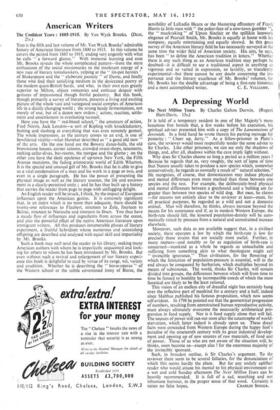A Depressing World
The Next Million Years. By Charles Galton Darwin. (Rupert Hart-Davis. 15s.) IT is told of a temporary resident in one of Her Majesty's more luxurious free hostels that, a few weeks before his execution, his spiritual adviser presented him with a copy of The Lamentations of Jeremiah. In a bold hand he wrote therein his parting message for posterity : " Cheer up, Jerry." As a fellow-prisoner in Plato's cave, the reviewer would most respectfully tender the same advice to Sir Charles. Like other prisoners, we can see only the shadows of things, and, after all, shadows within the cave imply light without.
Why does Sir Charles choose so long a period as a million years ? Because he regards that as, very roughly, the sort of lapse of time that Nature usually takes to produce a new species which, somewhat conservatively, he regards as normally a result of" natural selection." He recognises, of course, that domestication may induce physical and mental differences even more marked than those between one species and the rest. For example, the deliberately-bred physical and mental differences between a greyhound and a bulldog are far greater than between two species of wild dog. But man, he claims —for reasons not entirely clear to the reviewer at least—must, for all practical purposes, be regarded as a wild and not a domestic animal. Man will therefore, he thinks, always increase beyond the means for his sustenance and if, as in modern Western Europe, the birth-rate should fall, the lessened population-density will be auto- matically raised by pressure from a natural and unrestrained increase elsewhere.
Moreover, such data as are available suggest that, in a civilised society, there operates a law by which the birth-rate is low for precisely those strains that are socially most useful. Further, in many matters—and notably so far as regulation of birth-rate is concerned—mankind as a whole he regards as unteachable and suffering from something akin to what theologians might call "invincible ignorance." Thus civilisation, for the flowering of which the limitation of population-pressure is essential, will in the end always be conquered by barbarism, which multiplies beyond its means of subsistence. The world, thinks Sir Charles, will remain divided into groups, the differences between which will from time to time be fanned to hostility, by incompatible creeds of which the most fanatical are likely to be the least rational.
This vision of an endless city of dreadful night has certainly hung over the reflective part of mankind for a century and a half, indeed since Malthus published his famous proposition, which now seems self-evident. In 1798 he pointed out that the geometrical progression of numbers, resulting from unrestrained human reproductive activity, must always ultimately overcome the necessarily arithmetical pro- gression in food supply. Nor is it food supply alone that will fail. The sources of power will run out soon after the catastrophe of world- starvation, which latter indeed is already upon us: These dread facts were concealed from Western Europe during the happy fool's paradise of the nineteenth century with its great industrial develop- ment and opening up of new sources of raw materials, of food and of power. Those of us who are not aware of the situation will, he thinks, soon become so—except alas I for the enormous majority of the invincibly ignorant.
Such, in broadest outline, is Sir Charles's argument. To the reviewer there seem to be several fallacies, for the denunciation of which this seems hardly the place. But for any unduly uplifted reader who would attune his mental to his physical environment on a wet and cold Sunday afternoon The Next Million Years can be heartily recommended. It is full of a sad, searching and not inhumane humour, in the proper sense of that word. Certainly it


































 Previous page
Previous page